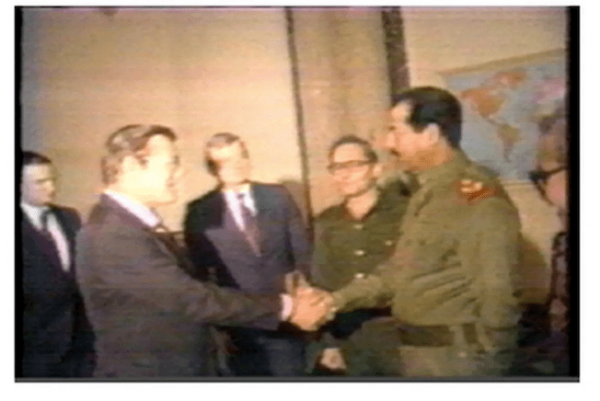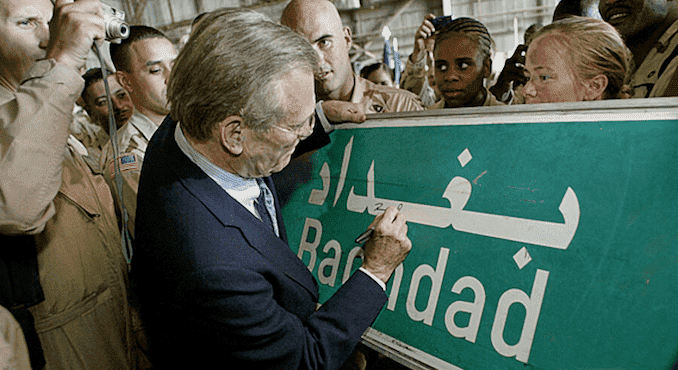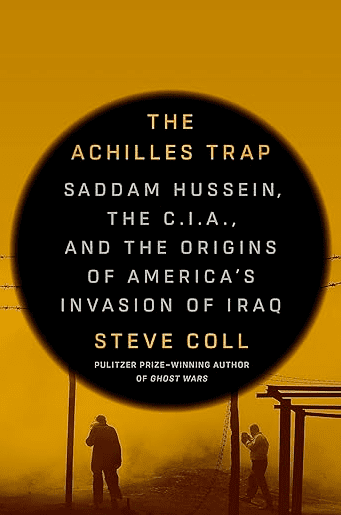|
إستماع
Getting your Trinity Audio player ready...
|
Steve Coll is the author of several highly regarded books, including, most recently, The Achilles Trap: Saddam Hussein, the United States and the Middle East, 1979–2003. He is the recipient of numerous awards, including two Pulitzer Prizes. Among the other books he has written are Ghost Wars: The Secret History of the CIA, Afghanistan, and Bin Laden, from the Soviet Invasion to September 10, 2001 (Penguin, 2001), Directorate S: The C.I.A. and America’s Secret Wars in Afghanistan and Pakistan, 2001–2016 (Penguin, 2018), and On the Grand Trunk Road: A Journey into South Asia (Penguin, 1993). Coll was previously the dean of the Columbia University Graduate School of Journalism, a staff writer at the New Yorker, and president and CEO of the New America think tank from 2007 to 2012. Diwan interviewed him in mid-April to discuss his latest book.
Michael Young: You’ve just published The Achilles Trap: Saddam Hussein, the United States and the Middle East, 1979–2003. After explaining the title, can you share the argument of your book, as well as letting us know what was new that you brought to a topic that has been much written about over the years?
Steve Coll: Saddam Hussein and the Central Intelligence Agency both drew on the myth of Achilles to explain how each imagined the other’s vulnerabilities. Saddam believed the United States was so reluctant to take casualties after the trauma of the Vietnam War, that it would never invade Iraq on the ground. He was also conditioned in this belief by the limited strikes carried out by the Clinton administration during the 1990s. On the U.S. side, successive presidents believed there was a plausible way to remove Saddam through the “silver bullet” strategy of fomenting a coup d’état. Both sides’ assumptions were misguided. They reflected broader misunderstandings between the antagonists and also specifically helped to shape the invasion of 2003.

I was drawn to the subject because an important part of the origins of the 2003 invasion and the disastrous war that followed is not understood. It’s true that scholars and journalists have raked over the failure of Western intelligence to discern that Saddam had no weapons of mass destruction (WMD), or even any remaining secrets about past work by the mid-1990s. And topics such as the selling of the 2003 invasion to Western publics are also familiar. But another vital question has largely gone unaddressed: Why did Saddam sacrifice his long run in power, his regime, and ultimately his life for weapons he did not possess? How and why did he help to create the impression that he had dangerous weapons when he did not?
These questions are answerable thanks to vast materials seized from the Iraqi regime after the invasion. They include thousands of hours of recordings from Saddam’s inner circle as well as millions of pages of documents from inside his presidency. Scholars made good use of some of these materials after they started to be released around 2007, but the files were then withdrawn and are no longer available. I filed a lawsuit under the Freedom of Information Act and was able to obtain a batch of materials, including discussions within Saddam’s regime never before published. Combined with interviews and other materials, this new archive enlarges our understanding of the causes and origins of one of the most disruptive events in the Middle East during the past two decades, and one of the most costly of U.S. foreign policy misadventures in the post-Cold War period.
MY: One theme running through your book is that the U.S.-Iraqi relationship was characterized by a mutual lack of understanding. Can you explain how this played out on the eve of the U.S. invasion in 2003, when the Bush administration was convinced, incorrectly, that Iraq possessed weapons of mass destruction?
SC: As you say, the answer to that question is narrated throughout the entire book, which covers how this mistrust and misunderstanding evolved over more than two decades, from the period of semi-secret cooperation between the United States and Iraq during the 1980s through the decade of enmity in the 1990s. To choose perhaps the single most salient reason that this misunderstanding developed, we should probably start in the summer of 1991. After the Iraqi invasion and occupation of Kuwait, and the U.S.-led war of liberation that followed, the United Nations passed resolutions sanctioning Saddam’s regime and demanding that it disarm itself of WMD and longer-range missiles. Inspectors prepared to arrive to enforce disarmament. That summer, Saddam effectively panicked. Largely in secret, he ordered his son-in-law, Hussain Kamel, to oversee the destruction of all existing WMD stocks and cover up facilities and dual-use industries so that inspectors would not find what they were looking for. Kamel did as he was ordered, but kept no records of the hasty, extensive destruction of WMD. Then he and other key figures in Saddam’s regime continued to lie to inspectors about the history of their programs, while pleading innocence. This episode created deep confusion both within Saddam’s government and, more importantly, in the minds of baffled inspectors. On the one hand they could find no WMD. On the other, they could see the Iraqis had covered things up and lied repeatedly about their activities. This implanted a conviction that Saddam could not be trusted, which lasted until 2003 even after extensive inspections found no traces of prohibited arms.
Why did Saddam take this fateful course? He wanted to be free of sanctions as quickly as possible. He figured that if the inspectors could not find any banned weapons, maybe he would get passing marks, or at least enough credit, to allow Russia and France to start advocating for sanctions relief in the UN Security Council. He also would not tolerate public humiliation. He did not want inspectors in white lab coats and clipboards to make a public display of his disarmament, which would not only have shamed him before his own people and the Arab world, but might have exposed him as weak and vulnerable, inviting attack by enemies internal or external. Saddam saw power in the starkest, most zero-sum terms: If you appeared weak, your enemies would certainly pounce.
MY: You take a somewhat revisionist view of Saddam Hussein—hardly favorable, but more cognizant of his constraints and what really motivated him throughout the years you cover in the book. What were the main conclusions you reached about the man, what impressions about him did you feel needed to be corrected, and why did you choose to do so?
SC: My goal was to humanize Saddam without sanitizing him so that we could better understand how and why he acted as he did. My sense was that in America at least Saddam was dismissed as a cartoon dictator, a laughable one-dimensional narcissist who remained in power solely through terror. The Saddam I encountered through the new materials was more complicated and, fortunately, more interesting to write about than that. He could be incredibly shrewd about power and even startlingly prescient about how power shifted and operated in relations between middle powers such as Iraq and great powers such as the United States. Yet he could also be deeply confused about the United States and the world, trapped in 1960s pan-Arab ideology, anti-Semitism, and tangled conspiracy theories. On the tapes, he can sound brilliant one moment and lunatical the next. As a writer, I was also grateful for his sense of humor and amused by his fondness for bourgeois comforts, which were traits that his comrades seemed to appreciate as well.
MY: Speaking of revisionist views, over the years, much blame in America has been heaped on Ahmad Chalabi for helping create the premise for war by providing sources of false information to the Bush administration. Yet, playing devil’s advocate, could one say that Chalabi, in the end, pursued his own agenda and was clever enough to exploit the strong desires of those within the administration, the president above all, who wanted to remove Saddam Hussein from office?
SC: I agree with that. He really didn’t work very hard to hide his self-interest or to disguise his activities, such as his secret collaboration with Iran, that made clear that he was playing his own game. Chalabi had a clear track record as an architect of a massive bank fraud in Jordan. In my experience as a journalist, when you encounter fraudsters of that scale, they generally don’t change their ways, even after they’ve been caught and punished.
MY: Why was Iran better able to exploit the postwar situation in Iraq than the United States, and why was Washington so blind to how the invasion in 2003 might enhance Iranian regional power? After all, the initial U.S. decision to build ties with Iraq during the Iran-Iraq war was aimed at ensuring that Iran would not gain regionally by defeating Iraqi forces.
SC: Iran was able to exploit the postwar situation in Iraq better because the U.S. plans for occupation were poorly prepared and badly conceived. Having said that, I’m not sure there was a “good occupation” blueprint that would have blunted Iranian influence, given that the Baathist state was shattered by the invasion, and that Iraq’s Shia population welcomed a revival of its faith and influence, which Iran was eager to support. Why did the Bush administration not anticipate this outcome? It’s something of a mystery. Ideologues in the administration seemed to have persuaded themselves that the establishment of the first truly democratic Arab government in the Middle East would somehow protect Iraq from Iranian subversion. It did not turn out that way.
MY: You end your book with Saddam Hussein’s hanging. From an American perspective, the invasion of Iraq is now widely regarded as a failure, but from within the region itself wasn’t there something beneficial in removing from power a man who had killed hundreds of thousands of people? I noticed you didn’t address this question in your book, which I found intriguing in light of the fact that, starting in 2010–2011, the whole region rose up against its despots?
SC: Certainly, the world and the region are better off without Saddam Hussein in power. Perhaps I should have acknowledged that in the brief assessment of the war’s costs that I provided in the epilogue. Unconsciously, I may have resisted doing so because that justification has been often used by architects of the 2003 war who aren’t willing to accept responsibility for any error.


